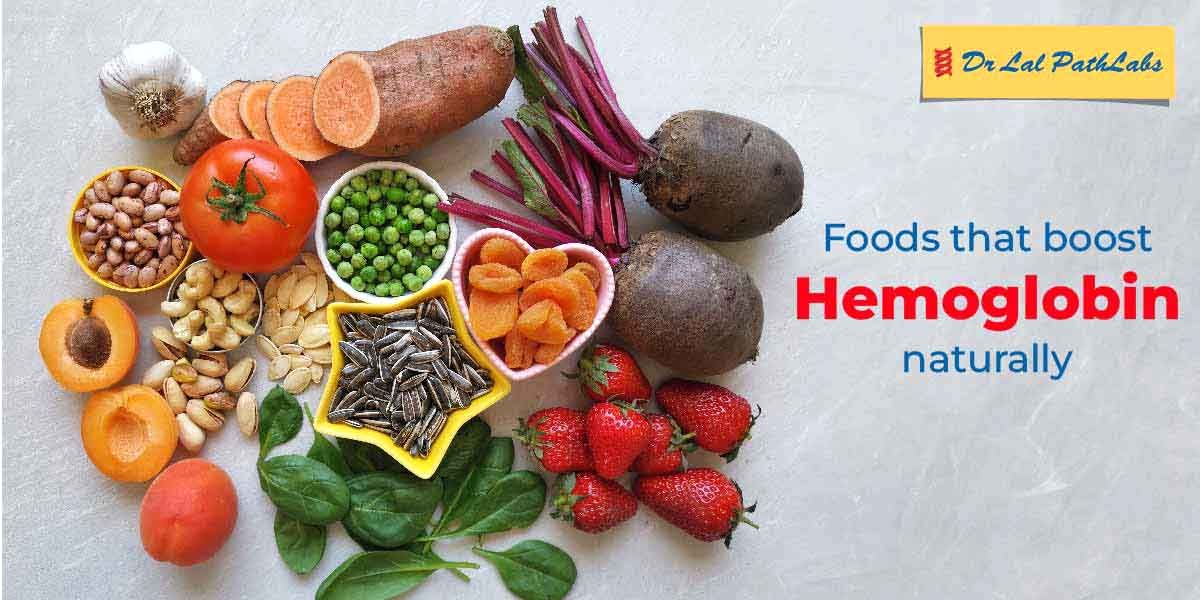Foods That Increase Hemoglobin Naturally
What is Hemoglobin?
Hemoglobin is a protein found in red blood cells that plays a crucial role in the transportation of oxygen throughout the body. It is responsible for carrying oxygen from the lungs to the various tissues and organs and delivering carbon dioxide, a waste product, from the tissues back to the lungs for exhalation.

What happens if your hemoglobin is low?
If your hemoglobin is low, it indicates a condition called anemia. Anemia occurs when your body doesn’t have enough red blood cells or when the red blood cells do not contain enough hemoglobin to carry an adequate amount of oxygen to the tissues and organs. Low hemoglobin levels can lead to several symptoms and health complications.
Symptoms of low hemoglobin
Symptoms of low hemoglobin include:
- Fatigue and Weakness
- Shortness of Breath
- Pale Skin and Cold Extremities
- Rapid or Irregular Heartbeat
- Dizziness and Lightheadedness
- Chest Pain
- Brittle Nails and Hair Loss
- Cold Intolerance
- Poor Immune Function
Causes of low hemoglobin
Low hemoglobin can be due to:
- Iron Deficiency
- Vitamin Deficiencies
- Certain chronic diseases like kidney disease, liver disease, autoimmune disorders, cancer, and certain infections.
- Inherited disorders like thalassemia and sickle cell disease can affect the production or structure of hemoglobin, leading to low hemoglobin levels and anemia.
- Inflammatory conditions, such as rheumatoid arthritis, lupus, or inflammatory bowel disease, can interfere with the body’s ability to produce or utilize iron effectively, resulting in low hemoglobin.
Foods that increase hemoglobin naturally
Let’s explore some nutrient-rich foods that can effectively increase hemoglobin and promote overall health.
- Leafy Green Vegetables: Leafy greens such as spinach, kale, and broccoli are excellent sources of iron, folate, and vitamin C, all of which are essential for hemoglobin production. Iron helps in the production of red blood cells, while folate aids in the formation of new cells. Include citrus fruits (oranges, lemons), berries, tomatoes, bell peppers, and broccoli in your meals. Vitamin C enhances iron absorption, making it easier for your body to utilize iron effectively.
- Legumes and Beans: Legumes and beans like lentils, chickpeas, and kidney beans are packed with iron, protein, and folate. Including these plant-based protein sources in your diet can significantly contribute to increasing hemoglobin levels. Moreover, they are low in fat and provide additional benefits such as fiber, which aids in digestion.
- Red Meat: Red meat, especially lean cuts like beef and lamb, is an excellent source of heme iron, which is easily absorbed by the body. Heme iron plays a crucial role in hemoglobin synthesis. If you consume red meat, ensure it is cooked properly and in moderation, as excessive intake may have other health implications.
- Poultry and Seafood: Poultry, such as chicken and turkey, and seafood like fish and shellfish, offer good amounts of iron and vitamin B12, both of which are essential for healthy hemoglobin levels. Opt for lean cuts of poultry and include a variety of fish like salmon, tuna, and sardines, which are rich in omega-3 fatty acids, promoting heart health.
- Nuts and Seeds: Nuts and seeds, including almonds, walnuts, flaxseeds, and pumpkin seeds, are nutrient-dense snacks that can boost your hemoglobin levels. They are rich in iron, vitamin E, and other essential minerals. Snacking on these nutritious options can provide a healthy dose of iron and help maintain hemoglobin levels.
- Fortified Cereals and Whole Grains: Choose whole grain products and fortified cereals that are rich in iron and other essential nutrients. Check labels for added iron and nutrients like folic acid and vitamin B12. These fortified options can be a convenient and tasty way to increase your hemoglobin levels.
- Fruits: Certain fruits are known for their iron-boosting properties. Include fruits like pomegranate, apples, citrus fruits (oranges, lemons, grapefruits), and berries in your diet. These fruits contain iron, vitamin C, and other antioxidants that aid in iron absorption and hemoglobin synthesis.
Tips to increase hemoglobin level at home
While it’s important to consult a healthcare professional for a proper diagnosis and treatment plan, there are some steps you can take at home to support healthy hemoglobin levels.
Here are a few tips:
- Avoid Iron Blockers: Certain substances can inhibit iron absorption. Limit your intake of coffee, tea, and calcium-rich foods (dairy products) during meals, as they can interfere with iron absorption.
- Cook in Iron Utensils: Cooking in iron pots or pans can increase the iron content of your meals. The iron from the utensils can leach into the food, providing a small boost to your iron intake.
- Stay Hydrated: Drink an adequate amount of water throughout the day to support overall health and proper blood circulation.
- Practice Good Gut Health: Maintain a healthy gut by consuming probiotic-rich foods like yogurt or fermented foods. A healthy gut promotes proper absorption of nutrients, including iron.
- Exercise Regularly: Engage in regular physical activity to stimulate blood circulation and promote red blood cell production. Consult with a healthcare professional before starting any exercise program.
- Manage Stress: Chronic stress can affect overall health, including red blood cell production. Practice stress management techniques like meditation, deep breathing exercises, or engaging in activities you enjoy.
Remember, these tips are not a substitute for professional medical advice. If you have concerns about low hemoglobin levels, it’s important to consult with a healthcare professional who can provide personalized guidance and recommend appropriate treatment options.
Conclusion
Boosting your hemoglobin levels naturally doesn’t have to be a complicated process. By incorporating these nutrient-rich foods into your daily diet, you can provide your body with the necessary components for healthy hemoglobin production.
Remember to maintain a balanced diet, stay hydrated, and consult a healthcare professional if you have persistent low hemoglobin levels. Enjoy these delicious foods while supporting your overall health and well-being.














